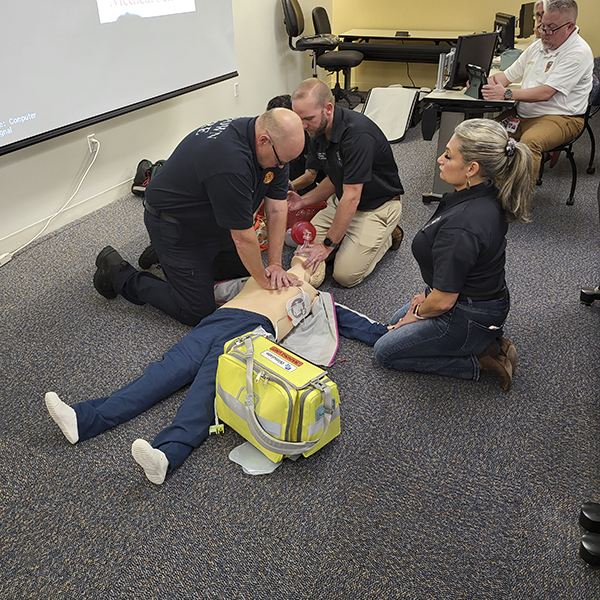Cardiac arrest care focus of Emergency Medicine symposium

More than 100 attendees learned the latest in cardiac arrest response at “State-of-the-Art Cardiac Resuscitation: From BLS to ECMO to Post-Arrest Care,” presented by the Texas Cardiac Arrest Registry to Enhance Survival (TX-CARES) and Penn Medicine TTM Academy.
Participants joined the daylong workshop at McGovern Medical School Friday, Nov. 11 for scholarly presentations, case reviews, panel discussions, and the personal testimony of cardiac arrest survivor Eric Herdejurgen. The Department of Emergency Medicine’s Mobile Simulation Training Unit, known as the Simbulance, was also on site
Prehospital and in-hospital breakout tracks included essential education on:
- How communities can improve bystander response and CPR rates
- 9-1-1 telecommunicator CPR
- High-performance prehospital resuscitation
- The value of point-of-care ultrasound in both prehospital and in-hospital settings
- The latest science and implementation strategies around in-hospital post-arrest care
- Our forthcoming prehospital extra-corporeal membrane oxygenation (ECMO) program
The goal of the conference was to highlight advances in care after out-of-hospital cardiac arrest (OHCA), which strikes nearly 75 Texans per day. A mere 7 percent survive with good or moderate functional outcomes.
“Out-of-hospital cardiac arrest is a leading cause of death and major public health problem,” said Bentley Bobrow, MD, chair of the Department of Emergency Medicine, John P. and Kathrine G. McGovern Distinguished Chair, and Nancy, Clive and Pierce Runnells Distinguished Professor in Emergency Medicine. “We have found large and unacceptable gender, socio-economic, racial, and geographic disparities in Texas with a five-fold difference in the chance of survival between communities. The pandemic worsened cardiac arrest survival due to lower rates of bystander CPR and other reasons, worsening these disparities. The ongoing Texas CARES program seeks to mitigate these disparities and improve the likelihood people will survive and return home to their families.”
The symposium was part of the ongoing TX-CARES program, a statewide registry and quality improvement program to measure and improve OHCA survival in Texas. TX-CARES is under the direction of Micah Panczyk, senior program manager –Department of Emergency Medicine.
“We started TX-CARES about 4 years ago, and it has grown to now include over half of the state of Texas,” Bobrow said.